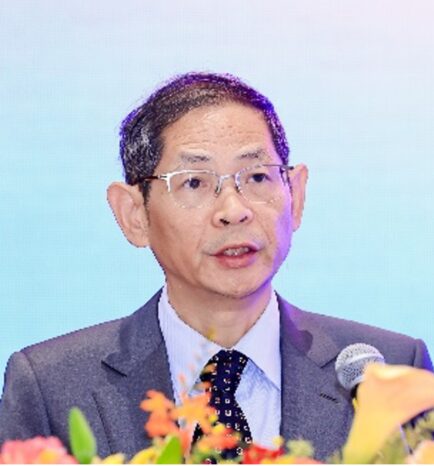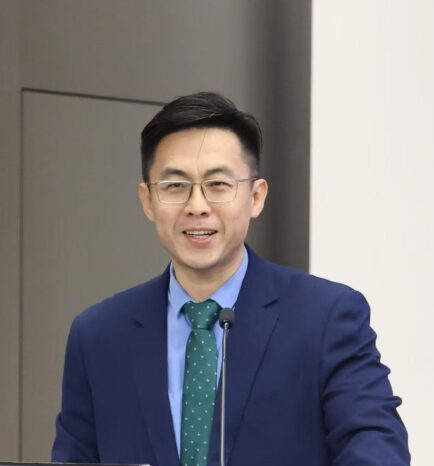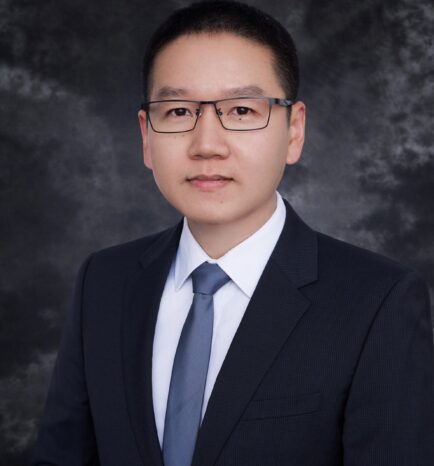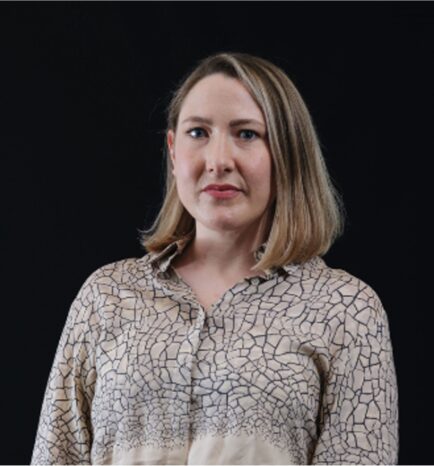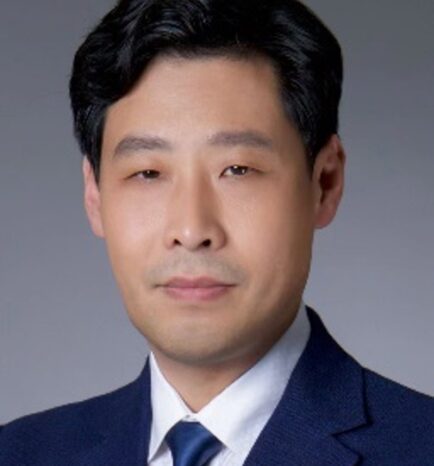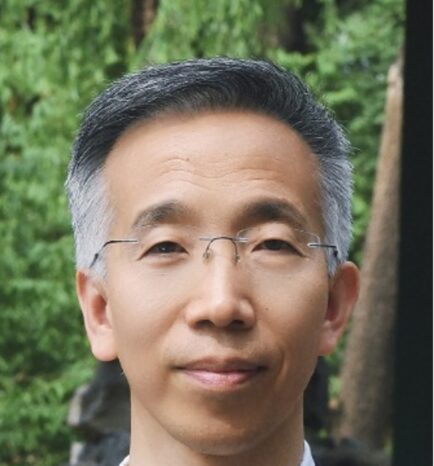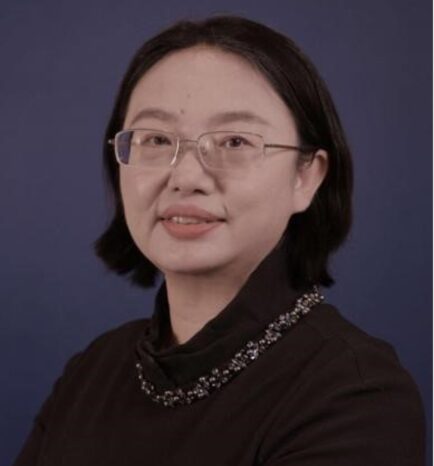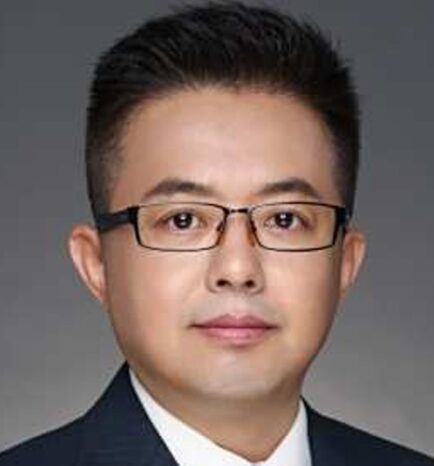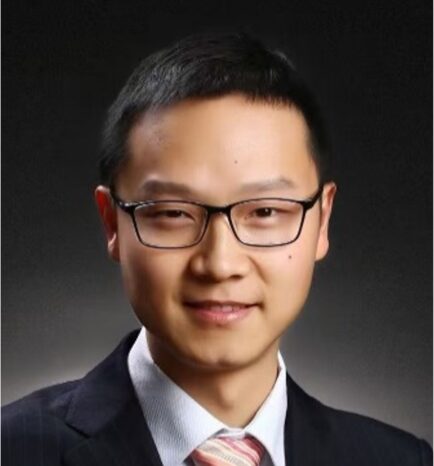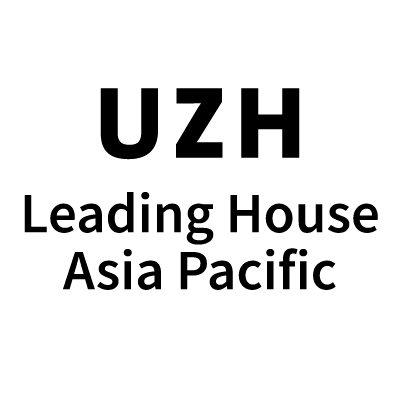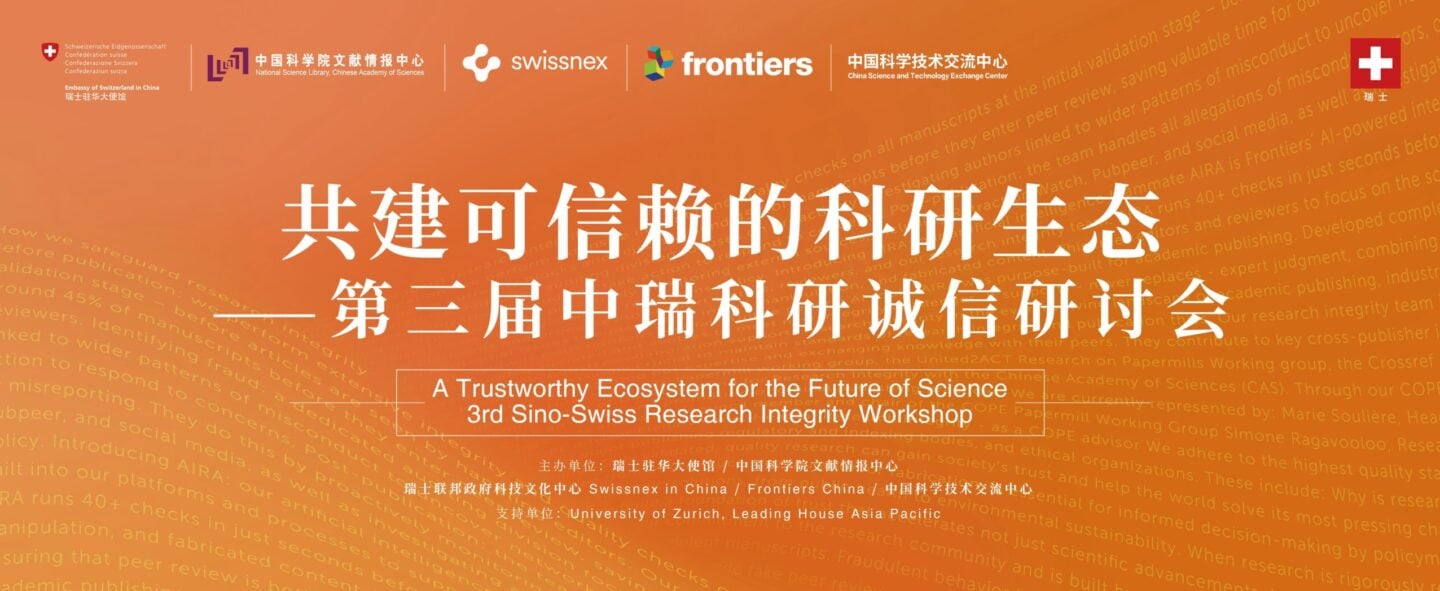
The workshop will bring together policymakers, academic experts, and industry leaders from both countries to address emerging challenges and share best practices in research integrity. It aims to provide valuable insights for fostering an ethical and trustworthy research ecosystem, while enhancing mutual trust, dialogue, and collaboration—especially among young scholars—in research integrity and scientific ethics.
A particular focus of the workshop will be the profound influence of rapidly advancing artificial intelligence (AI) technologies on research integrity and ethics. The discussions will address critical challenges posed by AI, with an emphasis on its applications in life sciences and medical ethics governance. During the event, experts from prominent Chinese and Swiss institutions—including the Ministry of Science and Technology’s Science and Technology Evaluation Center, the Swiss Competence Center for Research Integrity, the National Science Library of the Chinese Academy of Sciences, Tsinghua University, Peking University, ETH Zurich, and Zurich University of Applied Sciences—will present cutting-edge insights.
The seminar will feature an engaging program covering core themes such as:
- The impact of AI-generated content (AIGC) on academic integrity and research;
- Safeguarding academic integrity and public trust in AI-driven research;
- Lessons from China and Switzerland on collaborative frameworks in science ethics and research integrity;
- Ethical considerations for AI applications in precision medicine;
- Ethical review of clinical brain-computer interface research, with global perspectives;
- Responsible use of large AI models and intelligent technologies.
This year marks the third Sino-Swiss Research Integrity Workshop, with previous editions focusing on topics surrounding research integrity and responsible innovation.
As AI technology continues to advance at an unprecedented pace, the boundaries of research integrity are shifting, and ethical challenges have become increasingly complex and urgent. As leaders in scientific and technological innovation, China and Switzerland have been proactive in developing systems that uphold research integrity. This symposium seeks to foster international cooperation, leverage global expertise, and promote rigorous, ethical scientific research, contributing a China-Switzerland perspective to the establishment of a globally credible and trustworthy research ecosystem.
Program
14:00 (Beijing time) /08:00 (Swiss time) Registration
14:30/08:30 Welcome Remarks
- Jürg Burri, Ambassador of Switzerland to China
- Xiwen Liu, President, National Science Library, Chinese Academy of Sciences
- Frederick Fenter, Chief Executive Editor, Frontiers
- Xiaowei Zhang, China Science and Technology Exchange Center
14:50/08:50 Keynote 1: Sino-Swiss Framework for Tech Ethics and Research Integrity
- Xiaoyong Shi, National Center for Science and Technology Evaluation (NCSTE), Ministry of Science and Technology
- Edwin Constable, President of the Competence Center for Scientific Integrity Switzerland
- Q&A
15:25/09:25 Keynote 2: AI for Publishing: Between Innovation and Authenticity
- AI’s Role in Safeguarding Research Integrity: Quality and Integrity at Scale, by Julie Mo Svalastog, Research Integrity Manager, Frontiers
- AI-driven Data Pennant: Operating Models for Sci-tech Academic Journals, by Zheng Ma, Researcher, National Science Library, Chinese Academy of Sciences
- Q&A
16:00/10:00 Tea Break
16:10/10:10 Keynote 3: AI for Good: Responsibility and Practice
- Safeguarding Academic Integrity and Public Trust in the AI-Powered Research Era, by Jianbin Jin, Professor of Tsinghua University and Director of Tsinghua University Library
- A Reflective Approach for AI in Personalized Medicine, by Dr. Sara Kijewski, Health Ethics & Policy Lab, ETH Zurich;
- Correcting Research Bias? The Potential and Limits of Artificial Intelligence, by Li Tian, School of Journalism and Communication, Peking University
- Responsible Use of Large Language Models and Intelligent Agents, by Václav Pechtor, AI & Data Engineering, ZHAW School of Management and Law
- Ethical Review of Clinical Research on Brain-Computer Interfaces, by Dr. Xueqin Wang, No.6 Hospital of Peking University Health Science Center
17: 10/11: 10 Panel Discussion: Future of Academia – the Changing Role of AI?
- Moderator:
- Junpeng Yuan, Professor at National Science Library, Chinese Academy of Sciences, Director, Research Integrity and Responsible Innovation Committee of the Chinese Association for Science of Science and S&T Policy
- Panelists:
- Frederick Fenter, Chief Executive Editor, Frontiers
- Michael Conrad, AI Solution Architect, Machine Learning Engineer, Swiss Center for Design and Health
- Yang Xu, Professor, Department of Information Management, Peking University
17:50/11:50 Closing remarks
18:00/12:00 Buffet
Speakers
-
![]()
Bio
Jürg Burri
Ambassador of Switzerland in ChinaJürg Burri, born in 1965, Historian and former Journalist, joined the Swiss Foreign Service in 1996. He completed his diplomatic training with the Swiss Mission to the United Nations in New York, followed by postings in Berne and Brussels EU. 2006 till 2009, he served as the Minister/Deputy Head of Mission at the Embassy of Switzerland in Beijing, then got appointed Deputy to the State Secretary for Education, Research and Innovation and later DG for Consular Affairs. In 2018, he was appointed Ambassador of Switzerland to Poland. Since September 2022, Jürg Burri is the Ambassador of Switzerland to the People’s Republic of China, Mongolia and the Democratic People’s Republic of Korea, with residence in Beijing.
-
![]()
Bio
Xiwen Liu
Director of the National Science Library at the Chinese Academy of Sciences (NSLCAS)Professor Xiwen Liu, Director of the National Science Library at the Chinese Academy of Sciences (NSLCAS), and director of Center of Research Integrity, NSLCAS. He is also a professor and doctoral supervisor at the University of Chinese Academy of Sciences. Professor Xiwen Liu also serves as the managing director of the China Society of Scientific and Technical Information, the council member of China Association for Science and Technology Policy Research, and the editor-in-chief of “Think Tank Theory and Practice” and “Science Observation”. He has long been engaged in research on science and technology policy and strategic intelligence, scientometrics, information policy, competitive intelligence and technological competition intelligence, and regional innovation research and so on.
-
![]()
Bio
Frederick Fenter
Chief Executive Editor, FrontiersFrederick Fenter is the Chief Executive Editor of Frontiers, the open-access publisher based in Lausanne Switzerland. He studied chemistry (Ph.D. Harvard, 1990) and conducted research in atmospheric science for a number of years before moving into scientific publishing with an appointment as manager of the Inorganic Chemistry Program at Elsevier Science, Lausanne (1997). Since then, he has been founder of a start-up in publishing technology (FontisMedia SA, Lausanne); advisor to the launch of an institutional document repository (InfoScience); and publisher of an English-language University Press (EPFL Press, Lausanne). In 2013 he moved back to Frontiers, which he had previously advised as a consultant during its first 18 months of activity.
As Chief Executive Editor at Frontiers, Fred oversees one of the largest editorial boards in scientific publishing, and leads third party negotiations, public affairs, and business development, among others. He also spearheads Frontiers’ innovative editorial projects such as the Policy Labs, Frontiers for Young Minds, Frontiers in Science, and the Frontiers Forum. An active advocate for Open Science, Fred frequently organizes and participates in a variety of advocacy events and roundtables.
-
![]()
Bio
Xiaowei Zhang
China Science and Technology Exchange CenterXiaowei Zhang is from the European Division of the China Science and Technology Exchange Center.
-
![]()
Bio
Xiaoyong Shi
Researcher, National Center for Science and Technology Evaluation (NCSTE), Ministry of Science and TechnologyShi Xiaoyong mainly works on research and evaluation of science and technology innovation strategies and planning, national innovation systems, science and technology advancement, and research integrity. Has undertaken over 10 national-level projects mandated by Natural Science Foundation of China (NSFC) and National Social Science Fund (NSSF), and led or participated in more than 10 national-level projects involving science and technology innovation planning, strategic research, and policy analysis. He has published nearly 30 academic papers and authored or edited over 10 publications, providing crucial references for science and technology management and policy research. From 2013 to 2014, he was appointed by the Ministry of Science and Technology to serve as a Science and Technology Innovation Policy Analysis Expert at the Paris headquarters of the Organisation for Economic Co-operation and Development (OECD) for one year.
-
![]()
Bio
Edwin Constable
Founding President, Competence Center for Scientific Integrity SwitzerlandProfessor Edwin Constable was born in Edinburgh and grew up in Hastings on the South coast of England. He studied chemistry at Oxford, where he gained a B.A. and D.Phil. He moved to the University of Cambridge before being appointed to a University Lectureship and Fellowship at Robinson College in 1984. He remained in Cambridge until 1992, when he was appointed Professor of Inorganic Chemistry at the University of Basel. In 2000 he took up a position as a Professor of Chemistry at the University of Birmingham (England), where he was appointed Head of School. He returned to the University of Basel as a Professor of Chemistry in 2002. He became emeritus in 2023. He is the founding President of the newly established Competence Centre for Scientific Integrity Switzerland (KWIS). He is broadly active in areas of science policy and scientific integrity in addition to being a standing member of the Exact Science Evaluation Panel of the Belgian funding agency F.R.S.-FNRS. He has also been an external adviser to South African funding agencies on major infrastructure projects.
-
![]()
Bio
Julie Mo Svalastog
Research Integrity Manager, FrontiersDr. Julie Mo Svalastog is a Research Integrity Manager at Frontiers. Originally from Norway she joined Frontiers in 2022 after spending four years in the Peer Review Management team at SAGE Publishing and earning a PhD in Economic History at Leiden University (LU). She is based in London and currently supervises a team of 5 Research Integrity specialists sitting within the 60+ strong Frontiers Research Integrity Team.
The Frontiers Research Integrity team includes specialists from a number of different countries. The team is dedicated to maintaining high quality research and ethical standards in all Frontiers submissions and investigating concerns around breaches of research integrity and publication ethics. Julie has helped develop checks and processes for a robust quality triage to maintain quality at scale, ensuring only valid articles are published in Frontiers journals.
-
![]()
Bio
Zheng Ma
Professor, National Science Library, Chinese Academy of SciencesDr. Zheng Ma is currently a professor at the National Science Library, Chinese Academy of Sciences. He graduated from Nanjing University with a PhD in Library and Information Science and Archives Management. His long-term research focuses on the theory and application of information science and scientometrics study in the fields of academic publishing, scientific research management and academic evaluation. He has already achieved substantial research outcomes in particular area of the innovation and practice of scientific journal evaluation methodologies. He is a Standing Council Member of CESSP (China Editology Society of Science Peridocials) and a Registered Expert to ISO/TC46 (Technical committe of Information and documentation, International Organization for Standardization).
-
![]()
Bio
Jianbin Jin
Director of Tsinghua University Library, Professor of Communication, Tsinghua UniversityProfessor Jianbin Jin has served as the Director of Tsinghua University Library since September 2022. He earned his Bachelor of Engineering in 1991, Bachelor of Arts in 1992, and Master of Engineering in 1997 from Tsinghua University, and his Ph.D. in 2002 from Hong Kong Baptist University. Currently, he is a Professor of Communication Studies at the School of Journalism and Communication at Tsinghua University. He also serves as a Vice Chairman of Tsinghua University’s Academic Degrees Evaluation Committee and as the Chairman of its Subcommittee for Journalism and Communication. Additionally, Professor Jin holds the position of Vice Director of the Academic Library Division of the Library Society of China and is a Vice Director of the Beijing Committee for Academic Libraries.
Professor Jin is a member of the Editorial Boards of several prestigious journals in the field of journalism and communication, including the Asian Journal of Communication, Journalism & Mass Communication Quarterly, and the Chinese Journal of Communication.
-
![]()
Bio
Sara Kijewski
Health Ethics & Policy Lab, ETH ZurichSara Kijewski serves as Director of Operations of the ETH AI Ethics and Policy Network and is a researcher in the Health Ethics and Policy Lab at ETH Zurich. Her research focuses on AI governance, responsible innovation, and digital health, with particular expertise in practical tools for AI governance and the ethical dimensions of artificial intelligence in healthcare settings. Her academic background includes a PhD in Political Science from the University of Bern, providing her with a strong foundation in policy analysis and ethical frameworks.
Dr. Kijewski’s research portfolio spans AI governance frameworks, decentralized clinical trials, and the broad spectrum of ethical considerations in medical AI applications—from personalized medicine to clinical decision-making systems. Her work examines the intersection of technological innovation and ethical responsibility in healthcare AI development. Through her roles in operations and research, she contributes to advancing the responsible development and deployment of AI technologies across both healthcare and broader societal applications.
-
![]()
Bio
Li Tian
Dean, School of Journalism and Communication, Vice Dean of the School of New Media, Director of the Institute for Internet Development Studies, Peking UniversityLi TIAN, Dean of the School of Journalism and Communication, Vice Dean of the School of New Media, and Director of the Institute for Internet Development Studies at Peking University.
Her research focuses on media transformation and social governance in the context of digitalization and intelligentization, with primary interests in new media and online communication, intelligent communication and algorithm governance, as well as media use and digital rights.
-
![]()
Bio
Xueqin Wang
Associate Professor, Psychiatrist, Director of the Ethics Office of Peking University Sixth HospitalXueqin Wang, Associate Professor, Psychiatrist, Clinical Master’s Supervisor, Director of the Ethics Office of Peking University Sixth Hospital, Chairman of the Medical Technology Ethics Research Branch of the Beijing Medical Ethics Association, Vice Chairman of the Psychological and Behavioral Medicine Professional Committee of Beijing Association of Holistic Integrative Medicine, Member of the Public Health Ethics Committee, Chinese Preventive Medicine Association, Member of Mental Health Professional Committee of China Medical Women’s Association. Authored the Multidisciplinary Expert Consensus on Ethical Review of Clinical Research Involving Brain Computer Interface, and the Guidelines for Ethical Review of Clinical Research in Mental Disorders. Participated in the 7th edition of Shen Yucun Psychiatry, as well as 14 works on graduate textbooks in Sleep Medicine and Psychiatry. Served as an editorial board member and peer reviewer for multiple academic journals both domestically and internationally. Hosted one project of Ministry of Science and Technology of the People’s Republic of China and ministerial level projects. Published over 30 SCI and Chinese Core Journal Papers. She was awarded the second prize of the Science and Technology Progress Award from the Ministry of Education in 2020.
-
![]()
Bio
Václav Pechtor
ZHAW School of Management and LawVáclav Pechtor, Researcher AI & Data Engineering at ZHAW School of Management and Law Zürich. He is a PhD Candidate and Researcher specializing in the application and impact evaluation of Artificial Intelligence (including Large Language Models and intelligent agent systems) within public administration and public health. His work leverages expertise in causal inference methodologies for robust policy and program evaluation. With a strong background in leading technology and data initiatives, he is passionate about bridging advanced AI research with real-world governance challenges and fostering international academic-industry collaborations.
-
![]()
Bio
Junpeng Yuan
Professor at National Science Library, Chinese Academy of Sciences, Director, Research Integrity and Responsible Innovation Committee of the Chinese Association for Science of Science and S&T PolicyDr. Junpeng Yuan obtained his bachelor’s and master’s degrees from Southwest Jiaotong University and his doctoral degree from Beijing Institute of Technology. He currently serves as a Research Fellow at the National Science Library of the Chinese Academy of Sciences and Deputy Director of the Research Integrity Center. He is also a Professor at the University of Chinese Academy of Sciences, a doctoral supervisor, and a member of the Science and Technology Ethics Committee. Additionally, he holds positions as a member of the Liaoning Provincial Science and Technology Ethics Committee, a council member of the Chinese Society for Science of Science and Science and Technology Policy, Chair of the Research Integrity and Responsible Innovation Committee, and a member of the Scientometrics and Informetrics Committee, Editorial Board Member of the journal Data Analysis and Knowledge Discovery; Member of the Sociology of Science Committee of the Chinese Sociological Association; Founder of the Academic Standards and Research Integrity Alliance; Adjunct Researcher at the Center for Science and Technology Policy Studies, Tsinghua University; Adjunct Researcher at the Center for Science, Technology, and Education Development Strategy, Tsinghua University. Formerly served as a member of the Academic Degree Evaluation Committee at the Institute of Science and Technology Information of China, a research fellow, and head of the Secretariat of the Office for Research Integrity at the Ministry of Science and Technology. His primary research areas include scientometrics, science and technology evaluation, research integrity, and ethics policy.
-
![]()
Bio
Michael Conrad
Data scientist, Swiss Center for Design and HealthMichael Conrad is a data scientist. At the SCDH, he is responsible for the visionary further development of the Living Lab’s digital capabilities – including motion capture and sensor technology capabilities. He brings extensive experience in designing and delivering deep learning solutions across diverse domains. Having worked in both technical and leadership roles, He has developed a unique ability to bridge the gap between what’s technically feasible and what drives real business value. His approach is simple: listen first, build trust, and deliver solutions that actually work.
-
![]()
Bio
Yang Xu
Deputy Director of the Department of Information Management, Peking UniversityYang Xu received his Ph.D. from Ecole Centrale de Nantes, and currently serves as Deputy Director of the Department of Information Management at Peking University. He also holds the positions of Vice Chairman of the Beijing Data Standardization Technical Committee and Council Member of the Eighth Board of the France-Belgium Branch of the Western Returned Scholars Association. His research primarily focuses on data standardization, digital economy, and evaluation methodologies. He has published over 100 high-quality academic papers and undertaken various research projects, funded by the National Social Science Fund and the National Natural Science Fund, as well as commissioned projects from government and enterprise institutions such as the Ministry of Industry and Information Technology, the China Association for Science and Technology, Tencent, etc.

